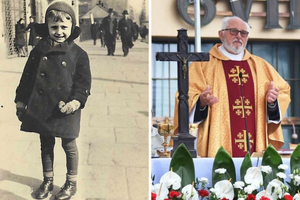Christ’s Flexible Will
User's Guide to Sunday, June 26

Sunday, June 26, is the 13th Sunday in Ordinary Time. Mass Readings: 1 Kings 19:16-21; Psalm 16:1-2, 5, 7-11; Galatians 5:1, 13-18; Luke 9:51-62
“You have to develop a flexible will,” Father Arthur Swain told me, again and again. This Sunday’s readings are telling me the same message again.
Father Swain was preparing me, in college, for confirmation. I had never heard the phrase “flexible will” before, but I figured I would hear it a lot in my Catholic life. I was wrong. I never heard it again — which is a shame, because it is a very helpful phrase.
Today’s readings describe what a “flexible will” looks like — a will that can choose what is best rather than being led by the nose, by appetites or desires.
The people Jesus calls in today’s Gospel want to follow Jesus but don’t have the ability to do so: They need to bid farewell to family members first, living or dead. Jesus calls out their inflexible wills, saying: “No one who sets a hand to the plow and looks to what was left behind is fit for the kingdom of God.”
Contrast Jesus’ way. We are told “he resolutely determined to journey to Jerusalem,” and he describes his life on the road this way: “Foxes have dens and birds of the sky have nests, but the Son of Man has nowhere to rest his head.”
When he gets to Jerusalem during Passion Week, we will watch him endure pain and suffering to do the Father’s will. But the journey to Jerusalem might be even more impressive. Being tortured is bad; enduring a long hard slog with no comfort or rest in order to get to your torturers is arguably worse.
Jesus is looking for people whose wills are flexible enough to embrace even that. His has a higher standard than what we see in the Old Testament reading, where Elijah allowed Elisha to go home before joining him on the road.
St. Paul describes Christ’s standard, in the second reading, to the Galatians. He calls Christians to “stand firm, and do not submit again to the yoke of slavery.” What slavery is he talking about? Slavery to “the desires of the flesh.”
This is the kind of inflexible will most of us have. I see it in myself all the time, and Father Swain’s warning often sounds in my heart.
My will is inflexible at mealtimes; I want to give my stomach and my taste buds all they want, when they want it, in the way they want it. My will is inflexible when plans change and I either refuse to change with them, or make everyone suffer my unhappiness at the new plan. My will is also inflexible at prayer time, when, instead of doing the deep, attentive meditation that will hold a mirror up to my spirit, I want to cut corners so that I can busy myself with Facebook or work or something — anything! — else instead.
When I think of the Catholics I most admire, they are not like that. They have a joyful acceptance of whatever comes along; they can eat or not, change plans and immerse themselves in prayer. They have truly achieved what St. Paul describes in his brilliant phrase: “For freedom, Christ set us free.”
They are not set free for irritable, foot-dragging, complaining obedience; they are set free for freedom.
So I like that idea of a “flexible will,” even if it isn’t in popular use. I did find it in one place when I Googled it, however. Historian Lacey Baldwin Smith used it to explain what was required of Catholics in Elizabethan England, when they suffered terrible persecution.
“The Catholic Church was forced to find new strength and new spiritual resources with which to roll back the armies of the devil,” he said. They needed “the tempered and flexible will of Ignatius Loyola and his Society of Jesus, and not the soft compromise and idle words of humanistic scholars.”
Many think America is headed for a time of persecution, and we will need the same thing: not a spirit of compromise or a spirit of spite, but a strong, flexible will capable of choosing the best way — the loving way — even when it is the hard way.
We will never develop that flexible will unless we start flexing it in small things, every day — starting today.
Tom Hoopes is writer in residence at Benedictine College in Atchison, Kansas.
His book What Pope Francis Really Said is available for preorder at Amazon.com.
CNA Instagram image
- Keywords:
- christian witness
- flexible will
- jesus
- tom hoopes
- user's guide to sunday
- wisdom
- June 26-July 9, 2016

















